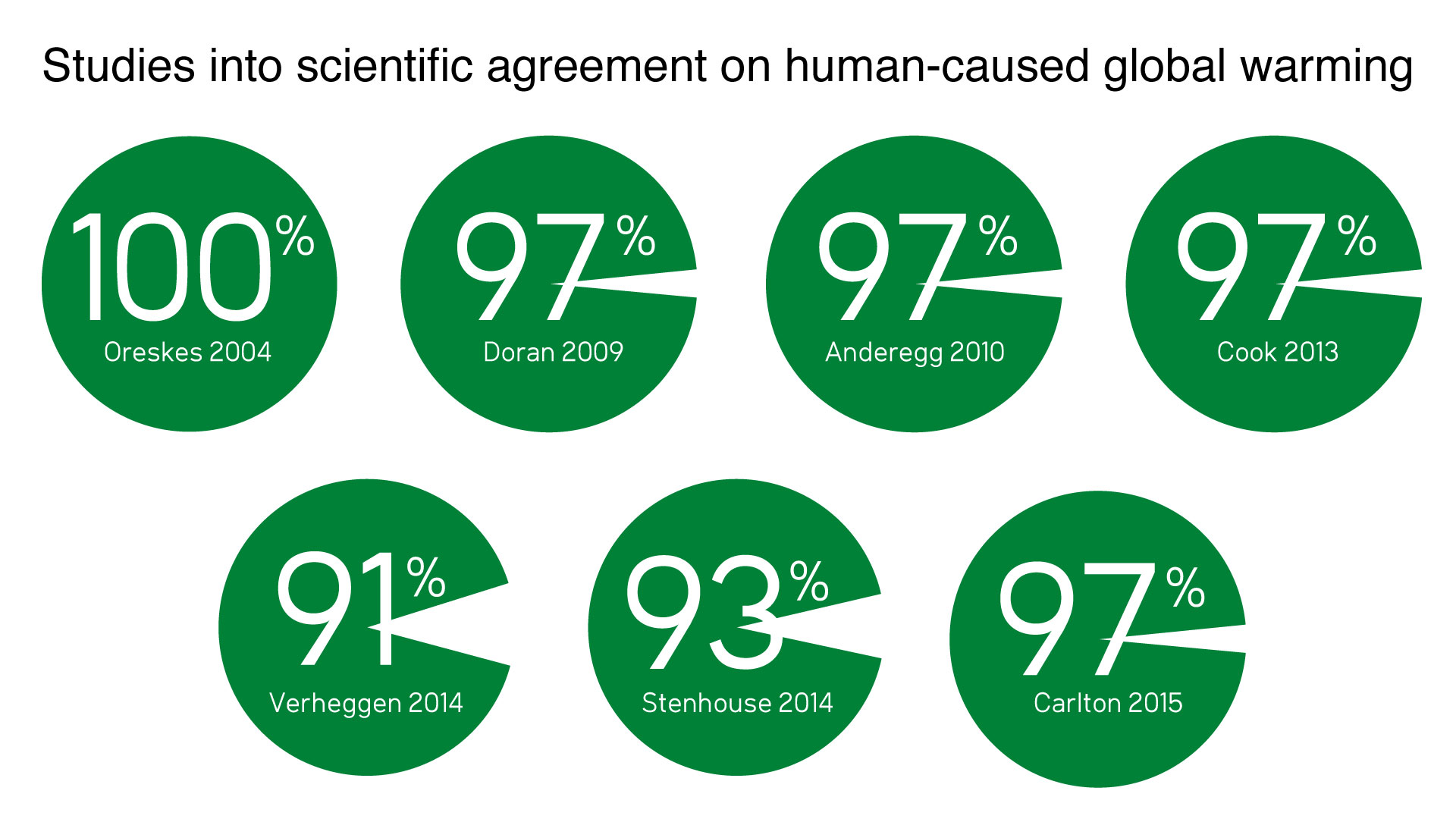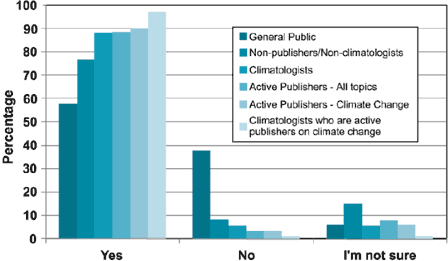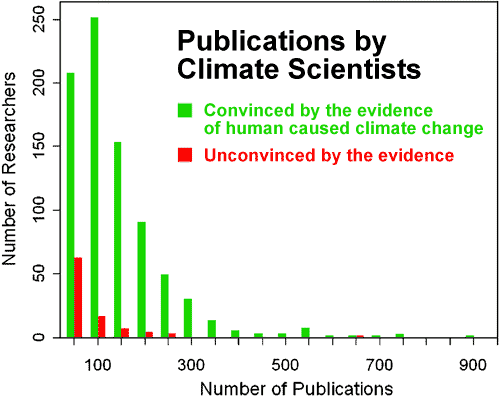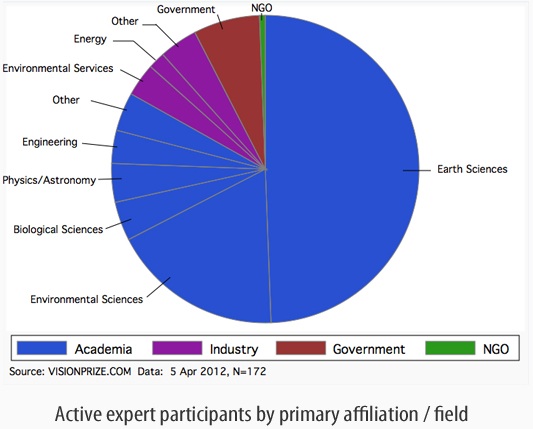
What The Science Says:
Multiple studies find between 90 to 100% of climate scientists agree humans are causing global warming, with multiple studies converging on 97% consensus. This position is also endorsed by the Academies of Science from 80 countries plus many scientific organizations that study climate science.
Climate Myth: There is no consensus
"[...] And I'll mention that the stat on the 97% of - of scientists is based on one discredited study." (Ted Cruz)
Authors of seven climate consensus studies — including Naomi Oreskes, Peter Doran, William Anderegg, Bart Verheggen, Ed Maibach, J. Stuart Carlton, and John Cook — co-authored a paper that should settle the expert climate consensus question once and for all. The two key conclusions from the paper are:
1) Depending on exactly how you measure the expert consensus, it’s somewhere between 90% and 100% that agree humans are responsible for climate change, with most of our studies finding 97% consensus among publishing climate scientists.
2) The greater the climate expertise among those surveyed, the higher the consensus on human-caused global warming.
Expert consensus results on the question of human-caused global warming among the previous studies published by the co-authors of Cook et al. (2016). Illustration: John Cook. Available on the SkS Graphics page
Scientific consensus on human-caused global warming as compared to the expertise of the surveyed sample. There’s a strong correlation between consensus and climate science expertise. Illustration: John Cook. Available on the SkS Graphics page
Expert consensus is a powerful thing. People know we don’t have the time or capacity to learn about everything, and so we frequently defer to the conclusions of experts. It’s why we visit doctors when we’re ill. The same is true of climate change: most people defer to the expert consensus of climate scientists. Crucially, as we note in our paper:
Public perception of the scientific consensus has been found to be a gateway belief, affecting other climate beliefs and attitudes including policy support.
That’s why those who oppose taking action to curb climate change have engaged in a misinformation campaign to deny the existence of the expert consensus. They’ve been largely successful, as the public badly underestimate the expert consensus, in what we call the “consensus gap.” Only 16% of Americans realize that the consensus is above 90%.
Scientists need to back up their opinions with research and data that survive the peer-review process. A Skeptical Science peer-reviewed survey of all (over 12,000) peer-reviewed abstracts on the subject 'global climate change' and 'global warming' published between 1991 and 2011 (Cook et al. 2013) found that over 97% of the papers taking a position on the subject agreed with the consensus position that humans are causing global warming. In a second phase of the project, the scientist authors were emailed and rated over 2,000 of their own papers. Once again, over 97% of the papers taking a position on the cause of global warming agreed that humans are causing it.
Lead author John Cook created a short video abstract summarizing the study:
A survey of all peer-reviewed abstracts on the subject 'global climate change' published between 1993 and 2003 shows that not a single paper rejected the consensus position that global warming is man caused (Oreskes 2004). 75% of the papers agreed with the consensus position while 25% made no comment either way (focused on methods or paleoclimate analysis).
Benny Peiser, a climate contrarian, repeated Oreskes' survey and claimed to have found 34 peer reviewed studies rejecting the consensus. However, an inspection of each of the 34 studies reveals most of them don't reject the consensus at all. The remaining articles in Peiser's list are editorials or letters, not peer-reviewed studies. Peiser has since retracted his criticism of Oreskes survey:
"Only [a] few abstracts explicitly reject or doubt the AGW (anthropogenic global warming) consensus which is why I have publicly withdrawn this point of my critique. [snip] I do not think anyone is questioning that we are in a period of global warming. Neither do I doubt that the overwhelming majority of climatologists is agreed that the current warming period is mostly due to human impact."
Subsequent research has confirmed this result. A survey of 3146 earth scientists asked the question "Do you think human activity is a significant contributing factor in changing mean global temperatures?" (Doran 2009). More than 90% of participants had Ph.D.s, and 7% had master’s degrees. Overall, 82% of the scientists answered yes. However, what are most interesting are responses compared to the level of expertise in climate science. Of scientists who were non-climatologists and didn't publish research, 77% answered yes. In contrast, 97.5% of climatologists who actively publish research on climate change responded yes. As the level of active research and specialization in climate science increases, so does agreement that humans are significantly changing global temperatures.

Figure 1: Response to the survey question "Do you think human activity is a significant contributing factor in changing mean global temperatures?" (Doran 2009) General public data come from a 2008 Gallup poll.
Most striking is the divide between expert climate scientists (97.4%) and the general public (58%). The paper concludes:
"It seems that the debate on the authenticity of global warming and the role played by human activity is largely nonexistent among those who understand the nuances and scientific basis of long-term climate processes. The challenge, rather, appears to be how to effectively communicate this fact to policy makers and to a public that continues to mistakenly perceive debate among scientists."
This overwhelming consensus among climate experts is confirmed by an independent study that surveys all climate scientists who have publicly signed declarations supporting or rejecting the consensus. They find between 97% to 98% of climate experts support the consensus (Anderegg 2010). Moreover, they examine the number of publications by each scientist as a measure of expertise in climate science. They find the average number of publications by unconvinced scientists (eg - skeptics) is around half the number by scientists convinced by the evidence. Not only is there a vast difference in the number of convinced versus unconvinced scientists, there is also a considerable gap in expertise between the two groups.

Figure 2: Distribution of the number of researchers convinced by the evidence of anthropogenic climate change and unconvinced by the evidence with a given number of total climate publications (Anderegg 2010).
The Vision Prize is an online poll of scientists about climate risk. It is an impartial and independent research platform for incentivized polling of experts on important scientific issues that are relevant to policymakers. In addition to assessing the views of scientists, Vision Prize asked its expert participants to predict the views of their scientific colleagues. The participant affiliations and fields are illustrated in Figure 3.

Figure 3: Vision Prize participant affiliations and fields
As this figure shows, the majority (~85%) of participants are academics, and approximately half of all participants are Earth Scientists. Thus the average climate science expertise of the participants is quite good.
Approximately 90% of participants responded that human activity has had a primary influence over global temperatures over the past 250 years, with the other 10% answering that it has been a secondary cause, and none answering either that humans have had no influence or that temperatures have not increased. Note also that the participants expected less than 80% to peg humans as the primary cause, and a few percent to say humans have no influence - the consensus was significantly better than the participants anticipated (Figure 4).
Figure 4: Vision Prize answers and expected distribution to the question "What influence has human activity had on global average ocean temperatures in the last 250 years?"
The following scientific organizations endorse the consensus position that "most of the global warming in recent decades can be attributed to human activities":
The Academies of Science from 80 different countries all endorse the consensus.
13 countries have signed a joint statement endorsing the consensus position:
A letter from 18 scientific organizations to US Congress states:
"Observations throughout the world make it clear that climate change is occurring, and rigorous scientific research demonstrates that the greenhouse gases emitted by human activities are the primary driver. These conclusions are based on multiple independent lines of evidence, and contrary assertions are inconsistent with an objective assessment of the vast body of peer-reviewed science."
The consensus is also endorsed by a Joint statement by the Network of African Science Academies (NASAC), including the following bodies:
Other Academies of Sciences that endorse the consensus:
Update January 28, 2017:
Some broken links were updated in the rebuttal. In addition, please check out the recent article Joint Statements on Climate Change from National Academies of Science Around the World published by Peter Gleick on his Significant Figures blog.
 |
The Skeptical Science website by Skeptical Science is licensed under a Creative Commons Attribution 3.0 Unported License. |